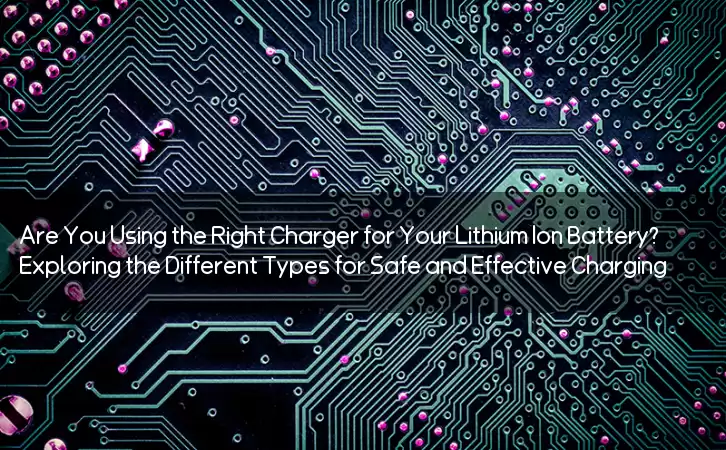Information Center
Are You Using the Right Charger for Your Lithium Ion Battery? Exploring the Different Types for Safe and Effective Charging
Published:2023-07-26 00:36:50 Author:Green WCND Views:52With the emergence of lithium ion batteries in various electronic devices, the question of what chargers work with them becomes increasingly important. Lithium ion batteries have become the preferred choice due to their high energy density, longer shelf life, and rapid recharge capabilities. However, using an incompatible charger can be dangerous, and can even cause damage to the battery or device. In this article, we will explore the different types of chargers that work with lithium ion batteries.

Firstly, it is important to understand the characteristics of a lithium ion battery and its charging requirements. Unlike traditional batteries, lithium ion batteries cannot be overcharged. Overcharging can lead to high temperatures, which can damage the battery or even cause it to explode. Therefore, lithium ion batteries require a charger that can automatically stop charging when it reaches its full capacity. This feature is commonly known as “smart charging”.

Secondly, it is important to note that different devices have different charging requirements. Some devices require a high current charging rate, while others require a slower charging rate. For example, smartphones and tablets often require a high current charging rate to quickly charge the battery, while cameras and other small electronic devices require a slower charging rate.

Based on these requirements, there are several types of chargers that are suited for lithium ion batteries. Let’s explore each of them in detail:
1. USB Chargers
USB chargers are commonly used for smartphones, tablets, and other small electronic devices. They are designed to provide a high current charging rate to quickly charge the battery. USB chargers are also compatible with most lithium ion batteries, making them a popular choice for portable electronic devices.
2. Wall Adapters
Wall adapters are similar to USB chargers, but are designed to be plugged into a wall outlet. They are often used for laptops, cameras, and other devices that require a slower charging rate. Wall adapters can also be used for smartphones and tablets, but they may not provide the same high current charging rate as USB chargers.
3. Portable Chargers
Portable chargers are battery packs that can be used to charge electronic devices while on-the-go. They often include built-in lithium ion batteries and charging ports for different devices. Portable chargers can provide a high current charging rate, making them ideal for smartphones and tablets. However, they may not be effective for larger devices that require a slower charging rate.
4. Car Chargers
Car chargers are designed to be plugged into a car’s cigarette lighter socket. They are often used for smartphones and other small electronic devices while traveling. Car chargers can provide a high current charging rate, but they may not be effective for devices that require a slower charging rate.
In conclusion, it is important to choose the right charger for your lithium ion battery to avoid any damage or safety risks. USB chargers, wall adapters, portable chargers, and car chargers are all compatible with lithium ion batteries, but it is important to understand the charging requirements of your device and battery. Always use a charger that is designed for your device and follow the manufacturer’s instructions for safe and effective charging.
For golf course managers, ensuring smooth and efficient operations is crucial for providing a memorable experience for golfers and maintaining the reputation of···
A battery tester ensures golf course cart batteries operate efficiently and reduces downtime through the following ways:I. Precise Battery Condition DiagnosisOp···
Battery testers significantly enhance the work efficiency of automotive maintenance technicians through several key ways:I. Rapid Diagnosis of Battery IssuesBat···
Battery testers play a crucial role in automotive battery production lines, significantly enhancing efficiency through highly automated testing processes and mu···





